The Perfect Pivot
From online learning to a quaranzine, Libraries expertise helped NC State get through the unprecedented year of the coronavirus pandemic
The spring 2020 semester instantly changed as NC State adjusted to the COVID-19 pandemic. Already expert at incorporating technology into teaching and learning, the Libraries was a campus leader in the almost-overnight turn to online classes, changing our services on the fly to support the needs of students and faculty amid the coronavirus chaos in March.
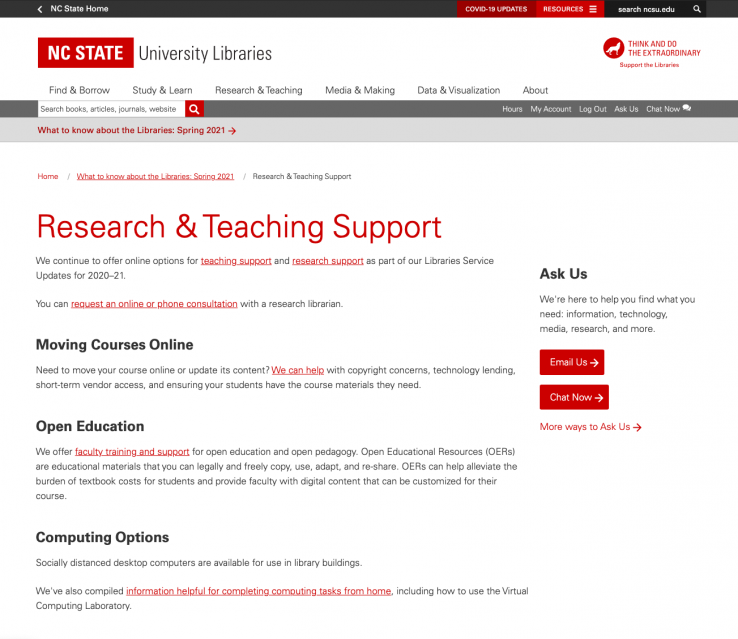
But the changeover to online learning was far from the Libraries’ only response to the pandemic. Librarians also stepped up with unique services and programs, as well as a robust spirit of volunteerism to help the many communities they serve. Here is a rundown of some of the ways the Libraries met the challenges of the pandemic throughout 2020.
Remote learning
We all remember “that week in March.” A bustling campus in the swing of a spring semester suddenly shut down. All Libraries facilities, including the Hunt and Hill Libraries, closed down overnight. But the Libraries’ long-standing expertise in facilitating online learning and providing technology services was activated instantly.
Drawing upon the Libraries Excellence Endowment, librarians immediately expanded online collections and services and made them even more available to students and faculty scrambling to adjust to a semester moved onto Zoom. Textbook scanning services kicked into high gear as requests for chapter PDFs flooded in, and staff volunteered to scan book excerpts in shifts to meet demand.
The Technology Lending Service bolstered the inventory of laptops, document cameras, headsets, and other items and expanded the long-term lending program, even shipping devices to students who had to relocate outside of Raleigh. And students could get mail delivery of books, too, through interlibrary loan—all at no extra cost.
The Libraries maintained a robust Coronavirus Response webpage that guided students and faculty to the online services they needed. These included the scheduling of live consultations with subject-expert librarians on research, technology, and data/visualization topics available via Zoom, phone, chat, and email.
It wasn’t just the variety of expanded services that set the Libraries apart in the university’s pandemic response; it was the fact that students and faculty in every college and department found what they needed when they needed it. A Biomedical Engineering faculty member appreciated the Libraries’ guide to freely available COVID-19-related standards. A Food Bioprocessing and Nutrition Sciences student was grateful for help navigating the eRA Commons system to create an account. A student in Plant and Microbial Biology gave exclamation point-laden thanks for help with a new subscription to Nature Ecology & Evolution. Given streaming video access to resources for her students on a very tight deadline, Dr. Jean Goodwin of the Department of Communication/Leadership in Public Science Cluster wrote “My (and my students’) hero! I just was circulating the announcement for a watch party this weekend, and it is wonderful that students will get to watch for free.”
The way the Libraries met the challenge of the pandemic through its services and programs, and supported students and faculty throughout the year, has been a testament to its staff’s devotion to the values of access to resources and the Libraries’ commitment to meeting—and especially to anticipating—the needs of the NC State campus.
Quaranzine
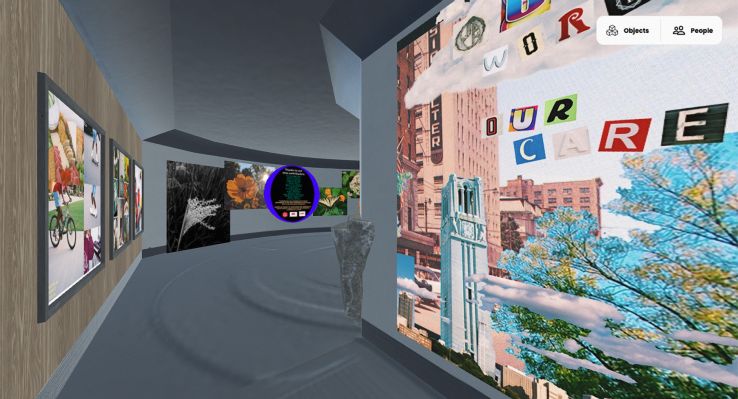
Before the pandemic, the Libraries held several popular zine workshops in the Fishbowl Forum space at the Hill Library. Gathering students around a table full of materials, Amanda Dahill-Moore of Learning Spaces & Services would talk about the form and tradition of the zine and provide a writing prompt, and Robin Harper of Preservation would teach a short lesson on a basic handmade binding. The workshops always ran over—students didn’t want to leave. “If I didn’t have to pack up the materials, they would have stayed there all night working,” Dahill-Moore laughs.
Not wanting to lose that momentum, Dahill-Moore teamed with University Library Technicians Cas Saroza and Colin Keenan to move the zine workshop online in May. “Dispatch from Quaranzine” was a virtual space that collected students’ quarantine musings in audio, video, drawing, and writing. Intended as a shared record of a strange time, the quaranzine gave students a unique creative outlet at a time when conventional art experiences and hands-on workshops were unavailable.
Instead of resembling a book or website, the Libraries’ quaranzine was a VR gallery space that you could walk around in. Keenan constructed corridors and rooms with writing, images, and multimedia content on the walls. And if other people were in the quaranzine with you, you could see their avatars moving around onscreen in the gallery, offering a moment of rare, public interaction.
“A few people said ‘I felt like I really went somewhere,’” Dahill-Moore says of the VR experience. “That novelty, variety, and spontaneity was in really short supply then. The space that Colin built felt like how you interact in the real world. It didn’t feel formulaic like some of the other interactions that we are having digitally right now. How we moved there felt freer.”
COVID-19 research access portal
Upon quarantine, there were suddenly virus experts being quoted in every article and broadcast—NC State researchers among them. As a central research hub for the university, the Libraries helped to compile a publicly accessible portal to connect the media with expert researchers and faculty across campus.
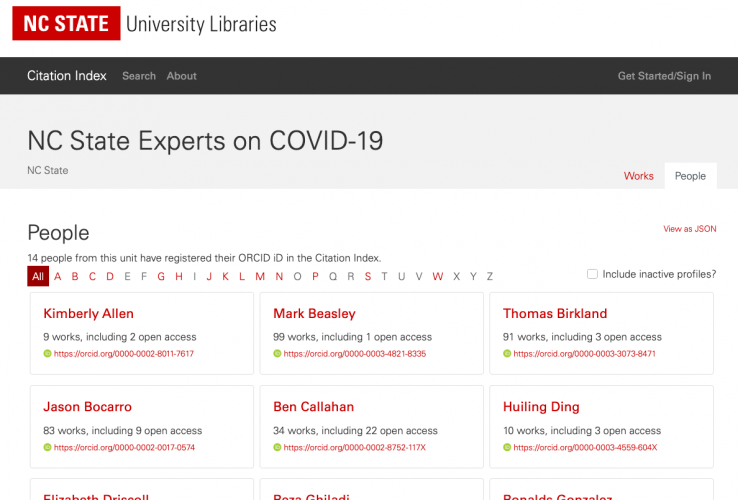
The Libraries’ COVID-19 research access portal featured a roster of researchers compiled by NC State University Communications. Most of the researchers were experts on topics related to what COVID-19 was altering, such as food safety, public policy in crisis, youth outdoor engagement, risk, and epidemic communication. The Libraries’ portal also provided open access to some of their published works.
“As a connection point to our expert researchers, we hope this portal will be used by journalists to comb through their works and connect facts and data from these scholars to important messages and information for the populace,” said Micah Vandegrift, Open Knowledge Librarian. “Also, in a time when mis/disinformation is a real challenge, this portal can be a resource for the curious public to discover new and pertinent knowledge on using social media for food safety communication, or what healthy homes for middle-schoolers look like in research literature.”
“Keeping Tabs” blog
With so many people sheltering in place and needing things to do, there were recommendations lists aplenty. And who better than librarians to recommend great things to read and watch?
The Libraries posted on a “Keeping Tabs” blog throughout the spring about the books they were cuddling up with, the movies and shows they were bingeing, and the music they were dancing to in their living rooms, as well as some interesting socially distanced activities.
Karen Ciccone (Department Head, Data & Visualization Services) touted NC State professor Rob Dunn’s book Never Home Alone about all the microbial life with which you share your home. Chris Tonelli (Director of External Relations) waxed musical about Father John Misty’s Off-Key in Hamburg (the proceeds from which went to COVID-19 relief for musicians). Beth Ashmore (Associate Head, Acquisitions & Discovery) got nostalgic about the ‘70s true-crime show Columbo. The blog was a great way for Libraries staff to pass on their interests—and for people to get to know the Libraries, too.
Moving events and programs online
With campus spaces shuttered, you might assume that the Libraries simply canceled its robust events programs. Nothing could be further from the truth! The Libraries seamlessly moved events online—and even found a silver lining in this adjustment.
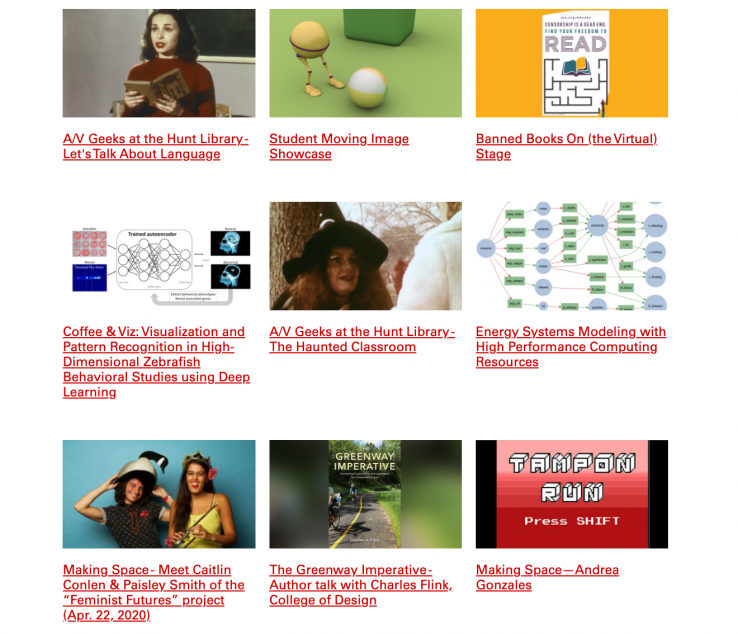
Popular Libraries event series like Coffee & Viz, Making Space, and A/V Geeks shifted onto web platforms and services, enabling Director of Program Planning and Outreach Marian Fragola to host a wider array of guests—with no travel and lodging expenses!—and offer interaction through chat during the event. The Libraries also now boasts a catalog of event recordings, so if you missed a Libraries program live, you can watch it at your convenience anytime. Visit www.lib.ncsu.edu/events/upcoming.
“Particularly with the Campus History Series, we have been able to interact with alumni from all over the country, who love the opportunity to come back to campus virtually and share their memories and experiences,” Fragola says of the pivot to online programming.
The Libraries had also been working on developing content for Twitch, the online streaming broadcast platform, before the pandemic. Quarantine sent Twitch offerings into overdrive as Libraries staff hosted broadcasts on using 3D modeling software, how to sew masks, or how to hit a new high score on Beat Saber. Oh, and on the wealth of online learning services available to students, too.
“Especially while some of our physical spaces are closed, this is a great way to have everyday, informal interactions with people about the Libraries and to continue offering help,” says Libraries Fellow Claire Cahoon. “The Libraries streamers interact with viewers in real-time over chat, answering questions about our equipment, programs, and the Libraries while they showcase the technology and expertise of those spaces live.”
Check out the Libraries’ Twitch channel schedule at www.twitch.tv/ncsulibraries.
Volunteerism
Remember way back in April, when everyone needed masks but suppliers were sold out of them? The Libraries Community Service Committee pounced on that need, as its Crafting for Charity (C4C) group met virtually to put their crafting skills to charitable use.
Libraries staff got together via Zoom and made masks for an assortment of groups including an equine veterinarian, the Apex Police Department, the WakeMed Raleigh Campus, and NCDPS Prison Healthcare. The group also made mask mates and ear savers for the Central Continuing Care Nursing Home, blankets for the Wake County Project Linus chapter, and knitted preemie hats for UNC Rex Healthcare.
Associate Head of Acquisitions & Discovery (Serials) Beth Ashmore and Electronic Resources Librarian Tessa Minchew took the lead on organizing the group, and Libraries staff including Christenna Hutchins, Danica Lewis, Dharini Baskaran, Hannah Rainey, Laura Abraham, Niqui O’Neil, Tisha Mentnech, and Tori Culler participated.
“It’s been really nice to put what I’ve learned to good use during this time,” Rainey told NC State News in a May article on campus volunteerism. “I think a lot of people want to be helpful. The best way we can all help is staying at home, but it’s really nice to have a way to contribute.” The C4C group convened again in July.
Personal Protective Equipment (PPE)
Several Libraries departments have been involved in producing Personal Protective Equipment (PPE). Led by University Library Technician Justin Haynes and Experiential Learning Services Librarian Colin Nickels, the Makerspace team produced and assembled hundreds of face shields using the laser cutter and 3D printers, as well as hand tools and textiles equipment. The completed shields were donated to both on-campus PPE representatives as well as some local health care workers. Some of the face shields went to Amanda Dahill-Moore’s mother who works at a local birthing unit. Others were passed along to a team in the Mechanical and Aerospace Engineering department coordinating PPE dispersal with local hospitals.
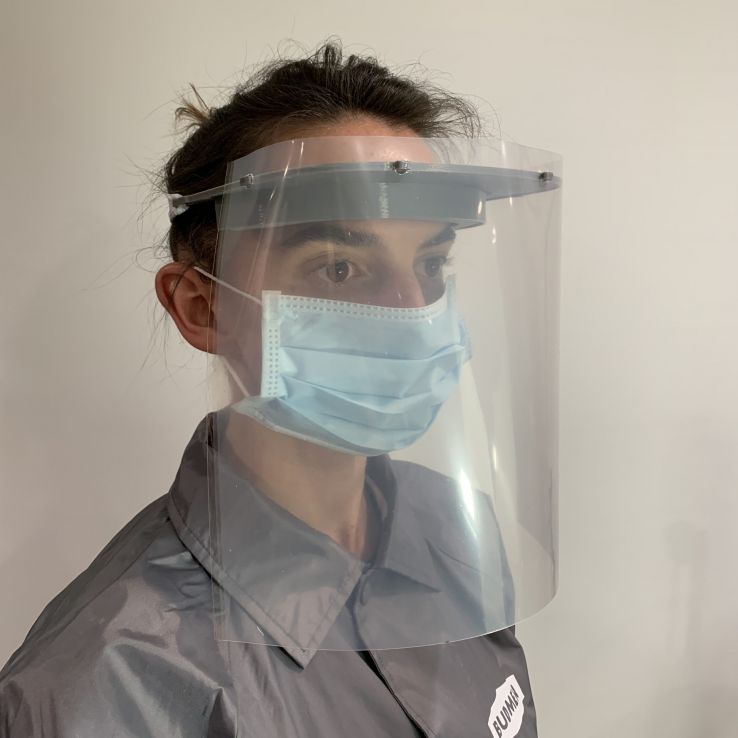
“The cutting of the face shield is the easiest part—it’s the handling that is pretty complicated, and the packaging,” Haynes says of the face shield making process, which he shared in biweekly calls with other North Carolina-based makers. Headbands made from elastic donated by Hanes are fastened onto a hard plastic frame to which the clear plastic shield is attached. Then a piece of foam goes on the inside of the hard plastic frame so the PPE is comfortable. And all that handling has to be followed by a thorough disinfecting. “All the cuts take, like, 30 seconds, but then it takes a couple of minutes to wash each shield down with alcohol and seal it in a plastic bag.”
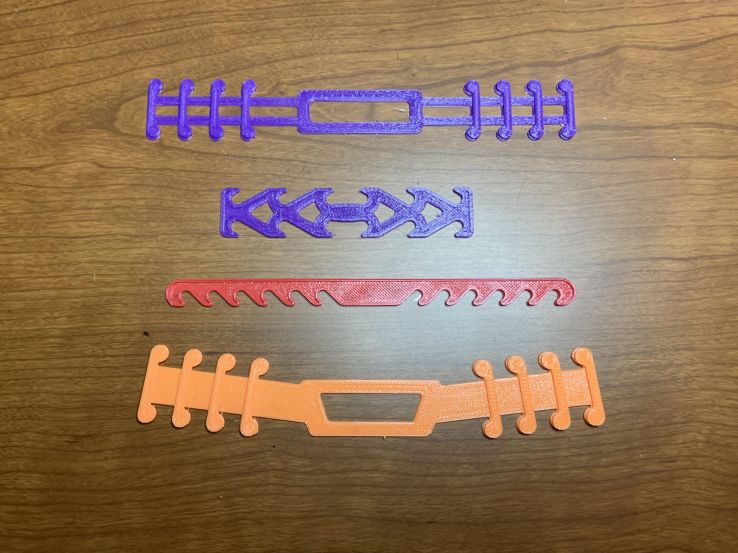
Facilities Maintenance Technician Tom Derosier also made surgical mask straps for medical workers to alleviate the irritation that straps can cause around the ears when you have to wear a mask for long periods of time. The straps hook onto a mask’s loops and go around the back of the wearer’s head, with notches to adjust for comfort. It’s a simple thing, but it meant an enormous amount to frontline workers.
After reading a newspaper article about the need for straps, Derosier suggested that Facilities put their hand-me-down 3D printer to work. The department uses the printer to make spare parts and hard-to-locate items used throughout the Libraries. He worked through a campus community coordinator to get the mask straps to areas most in need and worked with the Office of Research and Innovation to review his design.
Diana Rhyne, executive director for WakeMed Innovations, was particularly appreciative of Derosier’s work. “At a time when WakeMed and health systems across the globe are faced with challenges around critical personal protective equipment (PPE) and the uncertainties of COVID-19, NC State not only accelerated the production of face shields for WakeMed but also pioneered 3D printing for another medical application—straps for face masks. These straps help keep the mask elastics off the ears of our healthcare workers, providing added comfort that has truly made a difference as we continue to keep both our staff and patients safe and well cared for.”
Derosier’s devotion to the project is notable. He used one outdated printer until it died, then used a second until it died, and then built a working machine from the parts of the two dead machines. “Frankenstein’s monster was reborn in the form of a 3D printer made from two!” he jokes about the ordeal. “But it has really made me appreciate this machine even more. It’s nice to be able to use it to give something needed to someone.”
